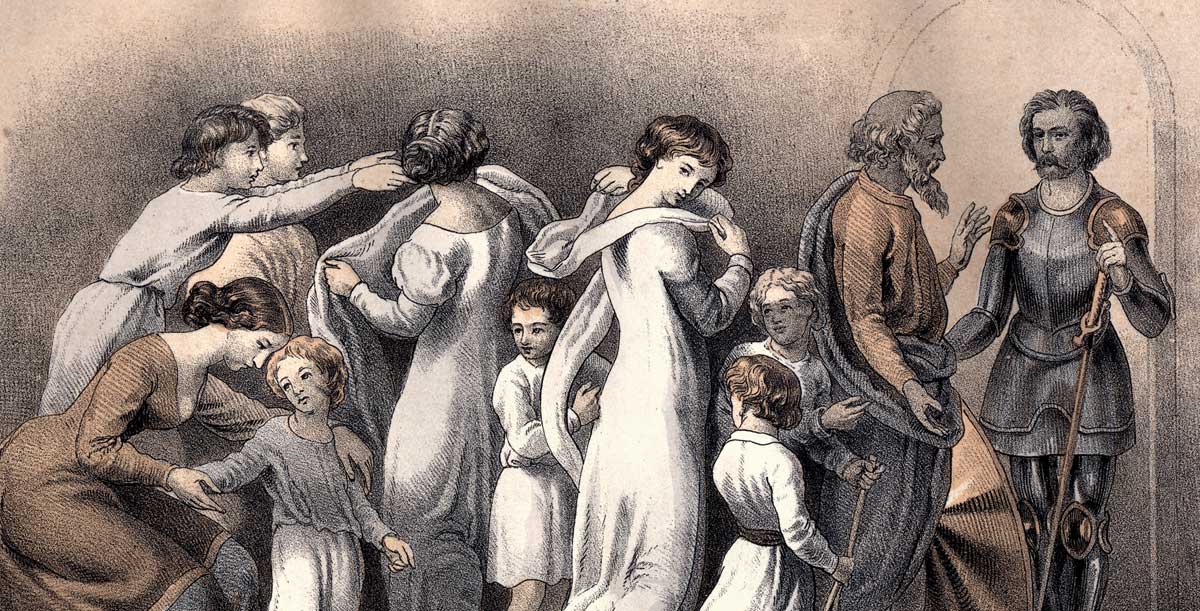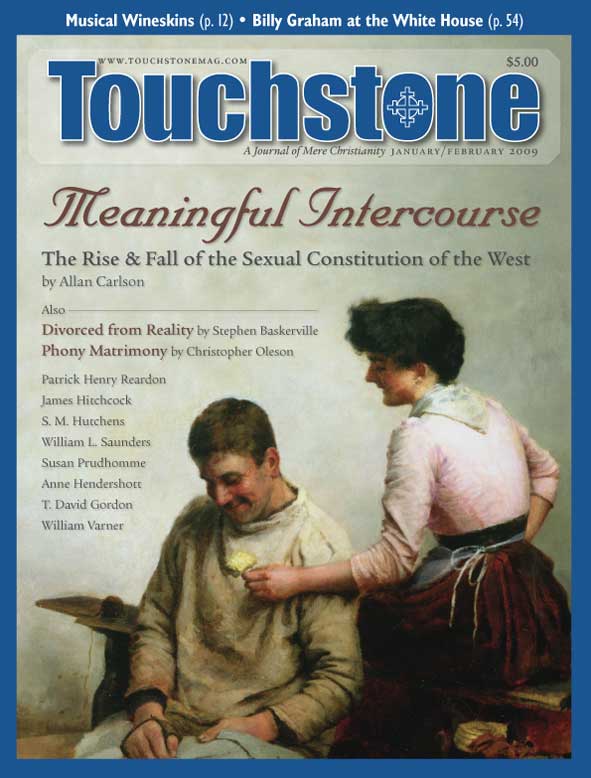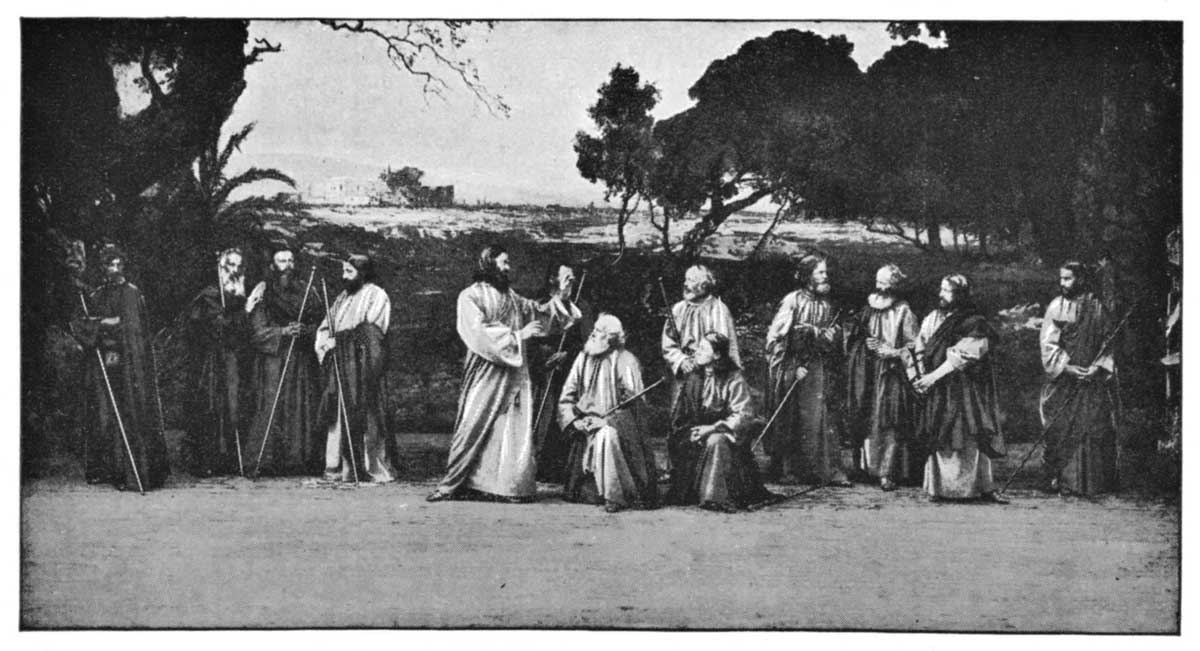Meaningful Intercourse
The Rise & Fall of the Sexual Constitution of Christian Civilization
When Massachusetts officials, facing the court case Goodridge v. Department of Public Health (2003), set out to protect that state’s marriage law from a challenge by seven homosexual couples claiming discrimination, the major line of defense was procreation. Making babies, the state argued, was the first purpose of marriage. By definition, same-sex partners could not create a child as a couple. This was important, the state’s argument continued, because children usually do best when growing up with their two natural parents.
And the initial trial court, let us remember, agreed with the state. The judge ruled that the primary purpose of marriage, under Massachusetts law, was in fact procreation. Accordingly, the court concluded that the state could reasonably distinguish between homosexual claimants to marriage and those heterosexual couples who were at least “theoretically . . . capable” of procreation without relying on “inherently more cumbersome” reproductive methods.
But of course, the trial court’s decision did not survive appeal to the Massachusetts Supreme Judicial Court. This higher court, on a 4–3 vote, dismissed the procreation argument, pointing to opposite-sex couples in which the woman was over childbearing age or that were otherwise infertile. Could the state “rationally” tell them that they could not marry? No, it could not. Indeed, the court noted that, under state law, even those “who cannot stir from their death bed” could marry, provided they were of the opposite sex. Last year, the Supreme Court of California similarly dismissed the procreation argument when it struck down that state’s marriage law as discriminatory.
In his book Why Marriage Matters, Evan Wolfson dissects the legal appeal to procreation, finding it in the end “riddled with holes.” If making babies is the purpose of marriage, he argues, then the marriages of Bob and Elizabeth Dole, John and Teresa Heinz Kerry, Pat and Shelley Buchanan, and even George and Martha Washington should all have been declared invalid. Another same-sex activist, Dale Carpenter, argues that if there were any merit to the procreation argument,
we would require prospective married couples to sign an affidavit stating that they are able to procreate and intend to procreate. If in, say, 10 years they had not procreated, we could presume they are unable or unwilling to do so and could dissolve the marriage as unworthy of the unique institution.
He adds that since no one has really proposed this, or anything like it, it is clear that the defenders of conventional family law “do not take the narrow procreationist view of marriage very seriously.”
Indeed, that usually faithful, conservative Supreme Court Justice Antonin Scalia, in his 2003 dissent in Lawrence v. Texas, noted:
If moral disapprobation of homosexual conduct is [of] ‘no state interest’ . . . what justification could there possibly be for denying the benefits of marriage to homosexual couples? Surely not the encouragement of procreation, since the sterile and the elderly are allowed to marry.
It is fair to conclude, I think, that use of the “procreation argument” to define the scope of marriage is in serious trouble.
Immediate questions become: Where did the bond between monogamous marriage and procreation come from? Why is it no longer self-evident? And what are the consequences of this change?
Allan C. Carlson is the John Howard Distinguished Senior Fellow at the International Organization for the Family. His most recent book is Family Cycles: Strength, Decline & Renewal in American Domestic Life, 1630-2000 (Transaction, 2016). He and his wife have four grown children and nine grandchildren. A "cradle Lutheran," he worships in a congregation of the Lutheran Church-Missouri Synod. He is a senior editor for Touchstone.
bulk subscriptions
Order Touchstone subscriptions in bulk and save $10 per sub! Each subscription includes 6 issues of Touchstone plus full online access to touchstonemag.com—including archives, videos, and pdf downloads of recent issues for only $29.95 each! Great for churches or study groups.
Transactions will be processed on a secure server.
more on sex from the online archives

27.6—Nov/Dec 2014
Tales of Forbidden Stereotypes
Real-Life Men & Women & the Tragic Loss of Human Comedy by Anthony Esolen

28.3—May/June 2015
Of Bicycles, Sex, & Natural Law
Describing Human Ends & Our Limitations Is Neither Futile Nor Unloving by R. V. Young
more from the online archives

14.6—July/August 2001
The Transformed Relics of the Fall
on the Fulfillment of History in Christ by Patrick Henry Reardon

27.6—Nov/Dec 2014
Tales of Forbidden Stereotypes
Real-Life Men & Women & the Tragic Loss of Human Comedy by Anthony Esolen
calling all readers
Please Donate
"There are magazines worth reading but few worth saving . . . Touchstone is just such a magazine."
—Alice von Hildebrand
"Here we do not concede one square millimeter of territory to falsehood, folly, contemporary sentimentality, or fashion. We speak the truth, and let God be our judge. . . . Touchstone is the one committedly Christian conservative journal."
—Anthony Esolen, Touchstone senior editor











